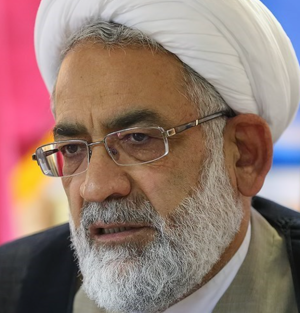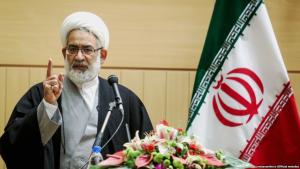Mohammad Jafar Montazeri: Chief Judge of the Supreme Court of Iran
Download PDFPage Navigation
Mohammad Jafar Montazeri is a 75-year-old mid-ranking cleric and longtime Islamic Republic judiciary official. He was sanctioned by the U.S. in December 2022 and by the U.K. in January 2023. The U.S. Department of the Treasury found that in his former role as prosecutor-general, he played a central role in prosecuting peaceful protesters. The U.K. sanctioned Montazeri in response to the execution of Iran’s former deputy defense minister for foreign affairs, Alireza Akbari, a dual British-Iranian citizen charged with spying. In August 2023, the head of Iran’s judiciary appointed Montazeri as chief judge of Iran’s supreme court for a five-year term. His appointment had the personal backing of Supreme Leader Khamenei. This profile provides an overview of Montazeri’s life and resume, with some concluding remarks on what to expect from him in his new role.
Childhood and Early Career
According to the biography published on the judiciary’s media outlet, Mizan News, Montazeri was born in 1948 in Qom, Iran. He received his primary education in Ashtian and later pursued religious studies at a seminary commissioned by Ayatollah Golpayegani. Montazeri’s instructors included Ayatollah Meshkini, Ayatollah Sobhani, Ayatollah Fazel Lankarani, and Ayatollah Golpayegani.
Early in his career, Montazeri worked under Mohammad Mohammadi Gilani, then a judge in Tehran’s Islamic Revolutionary Court and later chief of Iran’s supreme court. Under Gilani’s supervision, in 1988, Montazeri helped found the Judicial Organization of the Armed Forces out of the Islamic Revolutionary Guard Corps and Army prosecutors’ offices. The Judicial Organization of the Armed Forces effectively operates as a military court within the judiciary under Article 172 of the Islamic Republic’s constitution. Later, Montazeri became the deputy of parliamentary affairs in the Ministry of Justice and, subsequently, the first deputy to the prosecutor-general.
After serving as first deputy from 2001 to 2005, he assumed the role of the supreme leader’s special inspector within the judiciary. At the same time, he also became an advisor to then chief of the judiciary, Mahmoud Hashemi Sharoudi, until the latter was replaced by Sadegh Larijani in August 2009, two months after the Green Movement broke out in response to electoral fraud. Larijani appointed Montazeri to head the court of administrative justice, which is tasked with investigating complaints with respect to government officials under the head of the judiciary’s supervision. In 2012, the supreme leader appointed him chief judge of the influential Special Court for Clergy (SCC). This parallel judiciary operates under the supreme leader’s jurisdiction, focusing on crimes committed by clerics. Montazeri replaced Ali Razini at the SCC, while at the same time, Ebrahim Raisi, then first deputy chief of the judiciary, replaced Mohammad Salimi as prosecutor-general of the SCC.
Not much is known about Montazeri and Raisi’s work at the SCC. According to one dissident cleric “we don’t exactly know” which cases the SCC prosecutes. One prominent case during Montazeri’s tenure came in 2016. The SCC sentenced Ahmad Montazeri, the son of Grand Ayatollah Hossein Ali Montazeri, for publishing an audiotape on which his father can be heard condemning the 1988 political executions, known as the “chain murders.” Montazeri has held this position on the SCC through the present.
Prosecutor-General
 Mohammad Jafar Montazeri
Mohammad Jafar Montazeri
In 2016, then judiciary chief, Sadegh Larijani, appointed Montazeri to take over from Ebrahim Raisi as prosecutor-general, also known as attorney general. During this time, Montazeri left his position as the head of the court of administrative justice. The Islamic Republic’s constitution states in Article 162 that “the prosecutor-general must be a just mujtahid [ie. An authority in Islamic law] well versed in judicial matters. They will be nominated by the head of the judiciary branch for a period of five years, in consultation with the judges of the Supreme Court.”
However, the constitution does not provide detailed explanations regarding the roles and responsibilities associated with this post. In its sanctions notice, the U.S. Department of the Treasury indicated in broad strokes that as prosecutor-general, Montazeri “oversees prosecutions and the enforcement of criminal judgments throughout Iran, including such actions brought in Iran’s Revolutionary Courts.” The U.K. indicated he was responsible for the “trial process and the use of the death penalty.” He also issues directives to Iran’s courts and leads investigations as directed by the judiciary chief. Additionally, as prosecutor-general, Montazeri chaired the 13-member Working Group to Determine Criminal Content on the Internet, which shares authority to block or unblock websites with the judiciary; and he was also a Supreme Council for Cyberspace member. He was reportedly one of the most powerful actors on the Council.
Since assuming the role of prosecutor-general, Montazeri’s views on important legal issues have become public. His extremist views toward religious and ethnic minorities, women, political dissidents, and criminals within Iran’s Sharia law were exposed. In 2016, he referred to the Bahai religion as “a deviant movement which was created and nurtured by England and Israel.” He said this in calling for punishment of those who “glorify” and “contact” followers of the sect, specifically Faezeh Hashemi Rafsanjani, who had allegedly been in contact with Fariba Kamalabadi, a long-imprisoned Bahai community leader. Montazeri’s views toward women are no less shocking. In his view, removing the hijab is a crime; and women should not be allowed to enter stadiums “because it leads to sin.”
 Mohammad Jafar Montazeri
Mohammad Jafar Montazeri
Montazeri adheres to a strict system of justice, particularly for offenses like apostasy, extramarital sex, sodomy, alcohol consumption, theft, and highway robbery. In Islam, these offenses fall under the category of divine punishment, also known as “hudud,” which is mandated and fixed by God. For instance, Montazeri said in 2019, "Based on [the] Quran, God, the passionate and merciful has categorically ruled that the hands of a man or a woman, if proven guilty of theft, should be amputated.”
Women are also the target of a brutal legal campaign to enforce Sharia law. Later in 2019, in response to a video showing police brutality toward women for alleged “immoral” conduct, Montazeri reportedly quipped that the “judiciary supports a powerful police force.”
While some analysts considered Montazeri a potential candidate to succeed Larijani as chief of the judiciary in 2019, the supreme leader appointed Ebrahim Raisi, who then wanted to replace Montazeri as the prosecutor-general. The supreme leader stepped in to prevent Raisi from doing so and protected then-judiciary deputy Gholam-Hossein Mohseni-Ejei as well.
The significant cases and investigations Montazeri dismissed or obstructed provide insights into his priorities and perspectives on Islamic justice. After nationwide protests shook Iran in November 2019, Montazeri obstructed investigations into the murder of 1,500 peaceful protesters and the ill-treatment and abuse of political prisoners. Photos of detained prisoners with broken arms and injuries emerged in the media, and he remarked that all detainees have “declared their satisfaction” with the condition of the prisons. In October 2020, 40 women and girls were allegedly raped in Zahedan, and Montazeri not only refused to follow up with an investigation but criticized the imam that was seeking justice, saying that he “could be prosecuted under the law as a charge of disturbing the public mind."
That is why it is all the more surprising that many Western media outlets bought into the ploy put forward by Montazeri that the “Morality Police” had been abolished. He appeared to speak for the interior ministry, which controls the unit, saying, “Morality Police have nothing to do with the judiciary. It was abolished from the same place it was launched.” This indicated that this was not a “concession” to the opposition, as some Western media outlets hailed. However, no confirmation came from officials in the interior ministry, and the “Morality Police” later resumed their patrols. Later that same month, the U.S. Department of Treasury designated Montazeri for his involvement in the execution of peaceful protesters, including Mohsen Shekari, who was tortured, denied a lawyer, and executed three weeks after his sentence. There have been seven Woman, Life, Freedom protest-related executions during his tenure, and dozens of other death sentences have been handed down in the Revolutionary Courts. For instance, Mohammad Ghobadlou received two death sentences after sham trials, after Montazeri instructed prosecutorial authorities to expedite the criminal proceedings against him. In January 2023, the Islamic Republic executed Akbari, precipitating U.K. sanctions. Activists allege that an edited audio recording in which Akbari can be heard discussing the allegations resembles typical coerced confessions.
In August 2023, Iran’s chief of the judiciary, Gholam-Hossein Mohseni-Ejei, appointed Montazeri to be chief judge of the supreme court. Simultaneously, Mohseni-Ejei appointed the then-chief of the High Disciplinary Court of Judges Mohammad Kazem Movahedi Azad as the new prosecutor-general. Azad has a clerical background, with stints at the Tehran Province Prosecutor’s office; head of Branch 54 of Tehran’s Court of Appeal; special prosecutor for the clergy; and head of the Tehran Revolutionary Court. As an appeals judge, he upheld severe sentences against political prisoners convicted by Revolutionary Courts for their involvement in the 2009 Green Movement. He is also known for imposing lengthy sentences on leaders of the Bahai community.
Chief Judge of the Supreme Court
Unlike the role of prosecutor-general, this position is more clearly defined in the constitution. According to Article 161 of the Islamic Republic’s constitution, the chief judge of the supreme court is responsible for “supervising the correct implementation of the laws by the courts, ensuring uniformity of judicial procedure, and fulfilling any other responsibilities assigned to it by law, on the basis of regulations to be established by the head of the judicial branch.” The chief judge of the supreme court, appointed for a five-year term, also possesses the authority to appoint a prosecutor-general, probably in consultation with the head of the judiciary. Additionally, this role presides over capital offense and death penalty cases. Montazeri’s predecessor as chief judge was Seyyed Ahmad Mortazavi Moghaddam.
What to Expect from Montazeri
Montazeri’s ascension to chief judge of the supreme court comes at a particularly sensitive moment in the history of the Islamic Republic. The head of the judiciary, Gholam-Hossein Mohseni-Ejei, likely did not make this decision without input from the supreme leader. Given his direct connection to the supreme leader, it is anticipated that Montazeri will impose harsh penalties on individuals seen as adversaries of the regime, aiming to safeguard the Islamic Republic. This legal campaign, characterized by aggressive intimidation and coercion of internal regime opponents, will unfold within the context of broader trends. These trends include the rising utilization of the death penalty for minor offenses and the perpetration of brutality against prisoners. The appointment of Montazeri and his subsequent replacement by Azad as prosecutor-general indicate the ascent of the hardline right within the legal system.
Receive Iran News in Your Inbox.
Eye on Iran is a news summary from United Against Nuclear Iran (UANI), a section 501(c)(3) organization. Eye on Iran is available to subscribers on a daily basis or weekly basis.
Receive Iran News in Your Inbox
The Iran nuclear deal is done. And the world's biggest companies have already visited Tehran ready to strike a deal when sanctions end. These businesses will add even more to Iran's bottom line. And that means continued development of nuclear technologies and more cash for Hamas and Hezbollah.